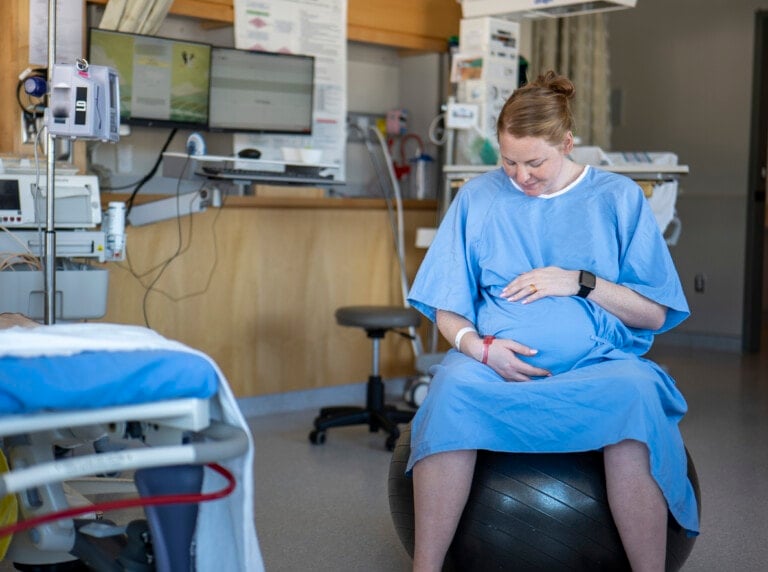You have been fueling your baby and body with nourishing foods throughout your pregnancy, but what about during labor? One may not have an appetite during labor, but knowing what foods support digestion, progression, and contractions can relieve stress. During early labor, your body uses much more energy than you may think. By eating these foods, you can ensure a steady and energized birth.
Certain nutrients, including complex carbohydrates, protein, and fruits and vegetables, will keep you going throughout your labor. They will also aid with the healing process and with the start of breastfeeding. Utilizing this knowledge and making informed decisions when preparing foods for early labor is essential for your and your baby’s health!
Foods to Eat in Early Labor
Complex Carbohydrates
Carbohydrates are our primary fuel source for all our daily activities. Complex carbohydrates are slower digesting and full of fiber to keep our bodies using the glucose produced by those foods for a more extended period of time. In other words, more complex carbs = more energy! By ensuring you eat enough carbs to fuel the entire birthing process, as well as prevent digestive discomfort during early labor, try incorporating these foods into snacks or meals:
Granola Bars
Granola bars are whole-grain options that are easy to keep in a hospital bag or your pantry. They will keep you full for longer than a processed snack alternative. Be sure to be mindful of the amounts of sugar in them, though, and opt for sugar-free or lower added sugar (less than 4 grams per serving) options.
Whole-grain Cereal
Packing a Ziploc of whole-grain cereal may seem like a snack for your infant down the line, but it is a great option to keep on hand during labor. The grains in cereals move quickly through the digestive tract and can help keep you regular, even during labor.
Power Proteins
Eating extra protein during early labor can help your muscles stay strong during a long stretch of stress and recover quicker once baby is here. Protein also prevents many moms from excessive tearing. Your overall protein needs increase during strenuous activity, like labor! Here are a couple of good options for protein-rich foods:
Greek Yogurt
Greek yogurt packs about 12 grams of protein per ½ cup serving. This quick snack can be easily eaten during any stage of labor and can help your body recover.
Protein Smoothies
Sipping on a protein-packed smoothie allows you to get your needs in fast and can also help keep you hydrated. Whey or plant-based protein powders can be purchased at your local grocery store or online and make great staples to have on hand.
Colorful Fruits and Vegetables
Not only do raw fruits and vegetables taste great, but they pack a big nutritional punch. Each color carries different nutrients, from vitamin A in orange to vitamin K in green. Pre-slicing apples, bell peppers, carrots, and berries can help you prepare for early labor hunger.
Fruit is great because it is fast-digesting and filled with fiber and water. It will give your body the essential carbohydrate fuel to endure the rest of your labor. And you can never go wrong with vegetables! Adding a variety of cut veggies to your early labor snack can also add water and water-soluble vitamins like vitamin C. This can help keep your electrolytes in check and prevent dehydration.
Pairing a fruit or vegetable with a fat and protein combo will allow the sugars in the produce to hit your bloodstream steadily. Try combinations like apples and peanut butter or celery and hummus.
Foods NOT to Eat in Early Labor
On the contrary, there are some foods you should avoid during labor. These foods may not sit well in your stomach while your body works hard to deliver a baby. Aim for light, whole-food snacks rather than heavy or fat-dense meals.
Spare the Sauce
Sauces and condiments are often full of dense fats and oils. These can slow down our digestion and make labor harder. If using condiments or sauces, look for ones with little to no fat content on the nutrition label.
Leave the Leftovers
Leftover meals can be large portions of unbalanced nutrients. This combination can take longer to move through your digestive system and cause discomfort during labor. Instead, meal prep easily digestible snacks and meals to keep around for early labor.
Unfamiliar Foods
Some foods can cause bloating, skin reactions, and other issues if you’re unknowingly intolerant to them. Avoid trying new foods during early labor to prevent additional digestive problems.
Using the information above, if you are in early labor and have an appetite, you should eat! Aim for whole-food carbohydrates and protein like yogurts, fruit, vegetables, and whole grains. These can relieve some anxiety surrounding labor and make for a happy baby.































